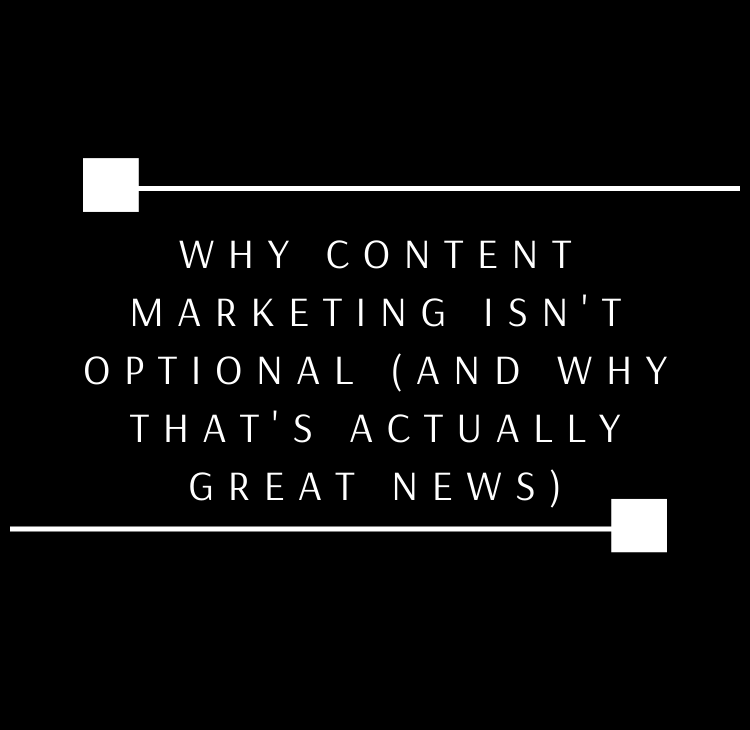
Why Content Marketing Isn’t Optional (And Why That’s Actually Great News)
Let me tell you about my neighbor Bob. Every morning, he stands in his driveway with a megaphone, shouting about his accounting services to anyone within earshot. Okay, I made Bob up – but you get the point. Nobody wants to be that person, and nobody wants to hear from that person.
That’s why I’m here to talk about content marketing — the art of attracting customers without chasing them down with a megaphone. And trust me, it’s a lot more fun (and practical) than Bob’s approach.
The Hard Truth About Modern Business
I’ll be direct: if you’re not doing content marketing in 2024, you might as well be using a typewriter and sending your proposals via carrier pigeon. Harsh? Maybe. But here’s why I’m saying this:
Your potential clients are already looking for solutions to their problems. Right now. This very second. They’re typing questions into Google, scrolling through LinkedIn, and asking their networks for recommendations. The question is: are you showing up in those moments, or is your competitor?
Content Marketing: The New Business Currency
Think about the last time you researched a product or service. You probably:
- Started with a Google search
- Read some blog posts and articles
- Watched explainer videos
- Checked out comparison guides
- Read customer reviews and case studies
- Finally considered making contact with a company
That’s content marketing in action. Every single step of that journey was shaped by the content someone created. If your business isn’t part of that journey, you’re invisible to potential customers until the end of their decision-making process – when everyone else’s content has already influenced them.
Why Traditional Marketing Just Doesn’t Cut It Anymore
Remember the good old days when you could buy some ads and wait for customers to roll in? Yeah, those days are gone. Here’s why:
- 70% of people would rather learn about a company through articles than advertisements
- 84% of people expect brands to create content that entertains, tells stories, and provides solutions
- 96% of B2B buyers want content with more input from industry thought leaders
- The average person consumes 11.4 pieces of content before making a purchase decision
The Secret Sauce: It’s Not About Selling (Mostly)
Here’s where most businesses get it wrong – they treat content marketing like a billboard. “Buy our stuff! We’re the best! Limited time offer!”
Yawn.
The real magic happens when you focus on being genuinely helpful. I know this sounds counterintuitive but stay with me. When you consistently create content that helps people solve their problems:
- They start to trust you
- They see you as an expert
- They come back for more
- They share your content with others
- And yes, eventually, they buy from you
The Content Marketing Pyramid (I Just Made That Up)
Picture a pyramid. At the bottom, you’ve got your foundational content – blog posts, articles, and essential videos that answer common questions. You’ve got your meaty stuff in the middle – detailed guides, case studies, and in-depth analysis. At the top, you’ve got your premium content – webinars, workshops, and exclusive resources.
The beauty of this approach? Each level builds on the one below it, creating a natural progression that takes people from “just browsing” to “shut up and take my money.”
The Five Pillars of Modern Content Marketing
Search Engine Optimization (SEO)
- Every piece of content is an opportunity to rank
- Your content answers questions your customers are asking
- You build authority in your industry
- Your website becomes a resource, not just a brochure
Social Proof
- Case studies showcase real results
- Customer stories build trust
- User-generated content provides authenticity
- Reviews and testimonials validate your expertise
Thought Leadership
- Industry insights demonstrate expertise
- Original research sets you apart
- Unique perspectives attract attention
- Expert positioning commands premium prices
Education
- How-to guides solve real problems
- Tutorials build user confidence
- FAQs address common concerns
- Resource libraries create value
Community Building
- Regular content builds loyal followers
- Engagement creates relationships
- Newsletters maintain connections
- Forums foster discussions
“But I Don’t Have Time for Content Marketing!”
I hear you. Really, I do. But here’s the thing: you don’t have time NOT to do content marketing. While you’re busy “not having time,” your competitors are:
- Building relationships with your potential customers
- Establishing themselves as industry experts
- Creating content that ranks in search engines
- Developing trust with your target market
- Growing their email lists
- And yes, making sales
The good news? You don’t have to do everything at once. Start small. One blog post a month. One video every quarter. One newsletter every few weeks. The key is consistency, not volume.
The ROI Nobody Talks About
Sure, we all know content marketing can drive sales. But let’s talk about the hidden benefits:
- Your sales team spends less time explaining basic concepts.
- Your customer service team gets fewer repetitive questions.
- Your expertise gets documented and can be shared easily.
- Your hiring becomes easier because candidates can understand your company better.
- Your business becomes more valuable because you’re building intellectual property.
How to Get Started (Without Losing Your Mind)
- Start with what you know. Don’t overthink it. What questions do your customers ask you all the time? Answer them. There’s your first month of content right there.
- Pick your platform. You don’t need to be everywhere. Choose one platform where your customers hang out and master it before expanding.
- Create a simple calendar. Map out your content topics for the next three months. Keep it realistic. It is better to do less consistently than to burn out trying to do too much.
- Repurpose everything. That blog post? Turn it into a video. That video? Turn it into social media posts. That presentation you gave? Turn it into an article. Work smarter, not harder.
The Most Important Thing: Just Start
Look, I could give you a hundred more reasons why content marketing is crucial. I could share more statistics about how companies that blog get 67% more leads than those that don’t. I could tell you about the client who tripled their business using nothing but strategic content.
But here’s what matters: Your potential customers are out there right now, looking for help. They’re trying to solve problems that you know how to solve. They’re asking questions that you know how to answer.
The only question is: will they find you, or will they find someone else?
A Quick Note About Sales (Because We’re All Here to Grow Our Businesses)
Yes, content marketing will help you make sales. But it does something even more valuable: it helps you make the right sales to the right people who understand what they’re buying and why they need it.
Think about it: would you rather spend an hour convincing someone they need your service or have them come to you already convinced because they’ve read your content and understand your value?
The Future of Content Marketing
The landscape is evolving rapidly:
- AI is changing how content is created and distributed.
- Video content is becoming increasingly important.
- Voice search is changing SEO strategies.
- Interactive content is on the rise.
- Personalization is becoming the norm.
However, the fundamental principle remains the same: provide value first, sell second.
The Bottom Line
Content marketing isn’t just another business buzzword or a nice-to-have marketing tactic. It’s the difference between being part of the conversation and being left out of it entirely.
Remember my fictional neighbor Bob with his megaphone? Don’t be Bob. Be the helpful expert who shows up exactly when people need you, with exactly the information they’re looking for.
Start small, but start now. Your future clients are already searching. Make sure they find you.
PS If you’re thinking, “this is all great, but I need help getting started,” – well, that’s why businesses like mine exist. But start with the free stuff first. Implement what you learn. Then, if you need help scaling up, you know where to find me. (See what I did there? Subtle, right?)
P.P.S. Want to know how much all this costs? Check out my detailed breakdown of content marketing costs. Because yes, good content marketing requires investment – but not having a content marketing strategy? That’s the most expensive option of all.
